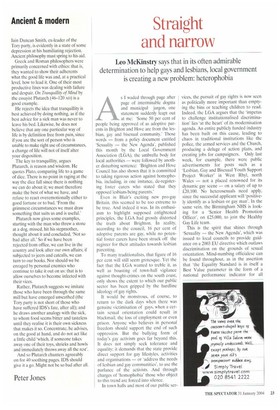Ancient & modern
lain Duncan Smith, ex-leader of the Tory party, is evidently in a state of some depression at his humiliating rejection. Ancient philosophy must spring to his aid.
Greek and Roman philosophers were primarily concerned with ethics: that is, they wanted to show their adherents what the good life was and, at a practical level, how to lead it. One of their most productive lines was dealing with failure and despair. On Tranquillity of Mind by the essayist Plutarch (46-120 AD) is a good example.
He rejects the idea that tranquillity is best achieved by doing nothing, as if the best advice for a sick man was never to leave his bed. Likewise, he does not believe that any one particular way of life is by definition free from pain, since if you are the sort of person who is unable to make right use of circumstances, a change of life will not of itself alter your disposition.
The key to tranquillity, argues Plutarch, is reason and wisdom. He quotes Plato, comparing life to a game of dice. There is no point in raging at the way the dice fall since there is nothing we can do about it; we must therefore make the best of what we have, and refuse to react overemotionally either to good fortune or to bad. 'From the grimmest circumstances we must draw something that suits us and is useful.'
Plutarch now gives some examples, starting with the man who threw a stone at a dog, missed, hit his stepmother, thought about it and concluded, 'Not so bad after all.' So if we have been rejected from office, we can live in the country and look after our own affairs; if subjected to jeers and catcalls, we can turn to our books. Nor should we be enraged by personal enemies who continue to take it out on us: that is to allow ourselves to become infected with their vices.
Rather, Plutarch suggests we imitate those who have been through the same mill but have emerged unscathed (the Tory party is not short of those who have suffered IDS's fate, after all); and he draws another analogy with the sick, to whom food seems bitter and tasteless until they realise it is their own sickness that makes it so. Concentrate, he advises, on the good at hand, and do not act like a little child 'which, if someone takes away one of their toys, shrieks and howls and immediately throws away all the rest'.
And so Plutarch chunters agreeably on for 40 soothing pages. IDS should give it a go. Might not be so bad after all.
Peter Jones




























































































 Previous page
Previous page